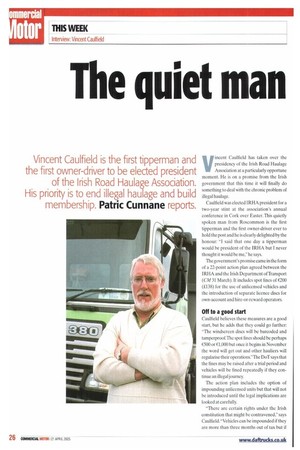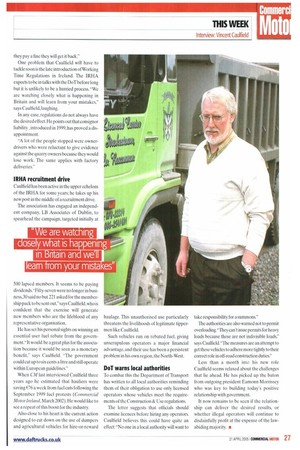The quiet man
Page 26

Page 27

If you've noticed an error in this article please click here to report it so we can fix it.
Vincent Caulfield is the first tipperman and
the first owner-driver to be elected president
of the Irish Road Haulage Association.
His priority is to end illegal haulage and build membership. Patric Cunnane reports. Vincent Caulfield has taken over the presidency of the Irish Road Haulage Association at a particularly opportune moment. He is on a promise from the Irish government that this time it will finally do something to deal with the chronic problem of illegal haulage.
Caulfield was elected IRHA president for a two-year stint at the association's annual conference in Cork over Easter. This quietly spoken man from Roscommon is the first tipperman and the first owner-driver ever to hold the post and he is clearly delighted by the honour: "I said that one day a tipperman would be president of the IRHA but I never thought it would be me," he says.
The government's promise came in the form of a 22-point action plan agreed between the IRHA and the Irish Department of Transport (CM 31 March). It includes spot fines of €200 (£138) for the use of unlicensed vehicles and the introduction of separate licence discs for own-account and hire-or-reward operators.
Off to a good start
Caulfield believes these measures are a good start, but he adds that they could go further: "The windscreen discs will be barcoded and tamperproof. The spot fines should be perhaps €500 or €1,000 but once it begins in November the word will get out and other hauliers will regularise their operations."The DoT says that the. fines may be raised after a trial period and vehicles will be fined repeatedly if they continue an illegal journey The action plan includes the option of impounding unlicensed units but that will not be introduced until the legal implications are looked at carefully.
"There are certain rights under the Irish constitution that might be contravened," says Caulfielcl."Vehicles can be impounded if they are more than three months out of tax but if they pay a tine they will get it back."
One problem that Caulfield will have to tackle soon is the late introduction ofWorking Time Regulations in Ireland. The IRHA expects to be in talks with the DoT before long but it is unlikely to be a hurried process. "We are watching closely what is happening in Britain and will learn from your mistakes." says Caulfield,laughing.
In any case, regulations do not always have the desired effect. He points out that consignor liability, introduced in 1999, has proved a disappointment.
"A lot of the people stopped were ownerdrivers who were reluctant to give evidence against the quarry owners because they would lose work. The same applies with factory deliveries."
IRHA recruitment drive
Caulfield has been active in the upper echelons of the IRHA for some years; he takes up his new post in the middle of a recruitment drive.
The association has engaged an independent company. LB Associates of Dublin, to spearhead the campaign, targeted initially at 500 lapsed members. it seems to be paying dividends. "Fifty-seven were no longer in business,30 said no but 221 asked for the membership pack lobe sent out," says Caulfield,who is confident that the exercise will generate new members who are the lifeblood of any representative organisation.
He has set his personal sights on winning an essential user fuel rebate from the government.-It would he a great plus for the association because it would be seen as a monetary benefit," says Caulfield. -The government could cut up to six cents a litre and still operate within European guidelines."
When CM last interviewed Caulfield three years ago he estimated that hauliers were saving €.76 a week from fuel cuts following the September 1999 fuel protests (Commercial Motor Ireland, March 2002). He would like to see a repeat of this boost for the industry Also close to his heart is the current action designed to cut down on the use of dumpers and agricultural vehicles for hire-or-reward haulage. This unauthorised use particularly threatens the livelihoods of legitimate tippermen like Caulfield.
Such vehicles run on rebated fuel, giving unscrupulous operators a major financial advantage, and their use has been a persistent problem in his own region, the North-West.
DoT warns local authorities
'To combat this the Department of Transport has written to all local authorities reminding them of their obligation to use only licensed operators whose vehicles meet the requirements of the Construction Si. Use regulations.
The letter suggests that officials should examine licences before hiring any operators. Caulfield believes this could have quite an effect: "No one in a local authority will want to take responsibility for a summons."
The authorities are also warned not to permit overloading."They can't issue permits for heavy loads because these are not indivisible loads," says Caulfield. "The measures are an attempt to get these vehicles to adhere more tightly to their correct role in off-road construction duties."
Less than a month into his new role Caulfield seems relaxed about the challenges that lie ahead. He has picked up the baton from outgoing president Eamonn Morrissey who was key to building today's positive relationship with government.
It now remains to be seen if the relationship can deliver the desired results, or whether illegal operators will continue to disdainfully profit at the expense of the lawabiding majority.










































































































































































































